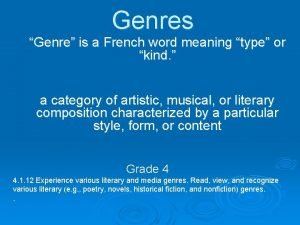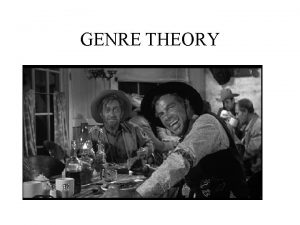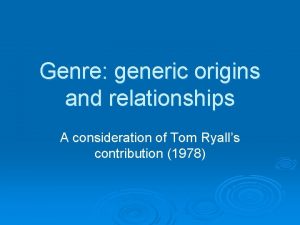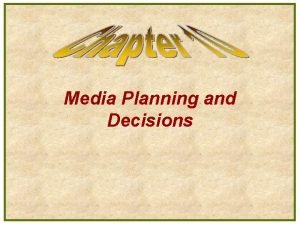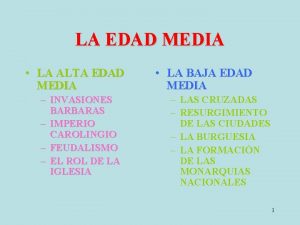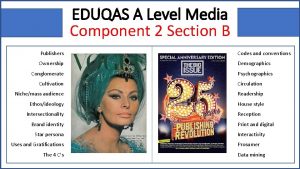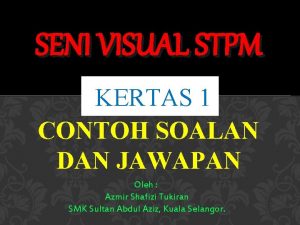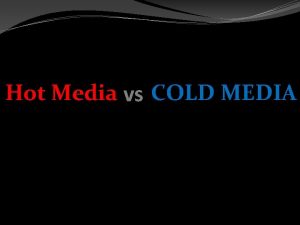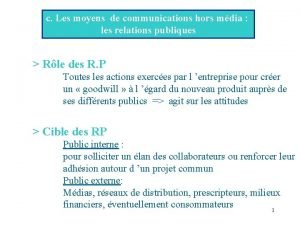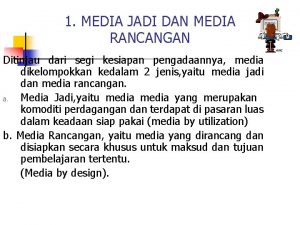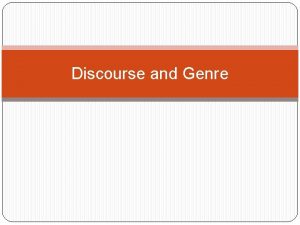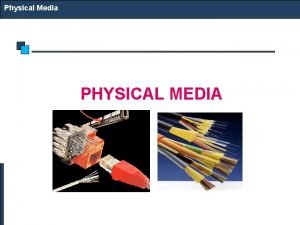Media Theory Genre Genre l What is Genre


















- Slides: 18

Media Theory Genre

Genre l. What is Genre? l. Genre means kind or type l. List as many genres as you can l. Identify characteristics of each genre

Genre l Genres have characteristic features that are known to and recognised by audiences l This ‘formula’ is reproduced again and again l E. g. in a Western we see similar characters, situations and settings

Genre l. Audiences and Genres l Why do audiences find genres satisfying? l Audiences develop an understanding that certain expectations may be fulfilled and they may find pleasure in predicting what will happen next

Genre l. Institutions and Genre l Producers of generic narratives depend on a certain amount of immediate communication with the audience l They want the narrative to be easily comprehensible l Genres that use key components that are easily recognisable are particularly important

Genre l Audiences know what to expect from a genre but at the same time want some variations to prevent dissatisfaction and even boredom l Thus any text in a genre is a combination of the familiar and the unexpected

Genre l Key Components of Genre l STOCK CHARACTERS l STOCK PLOTS, SITUATIONS, ISSUES AND THEMES l STOCK LOCATIONS AND BACKDROPS l STOCK PROPS AND SIGNIFIERS l MUSIC AND SOUNDS l GENERIC CONVENTIONS

Genre l Problems of genre l Actually defining a genre is inherently problematic l E. g. What is the difference between an Action/Adventure film and a Thriller? l Or between a thriller and a Horror film? l Is Seven a Thriller, a Horror film, or a Film Noir? l Is Film Noir a genre?

Genre l We can hope to engage with these problems by considering a more advanced approach to Genre Theory l Rick Altman in his book Film/Genre has proposed what he calls the: l SEMANTIC/SYNTACTIC APPROACH

Genre l Using this approach we need to consider genre in two ways: 1. SEMANTIC l This is concerned with the conventions of the genre that communicate to the audience such as characters, locations, props, music, shooting style and other signifiers

Genre l E. g. In a Western we would expect to see: l Horses l Guns l Hats l Wilderness l Native Americans l Etc

Genre 2. SYNTACTIC l This is concerned with the relations between these elements and the structure of narratives in genres l E. g. In a romantic comedy we expect the potential lovers to begin by not liking each other l There are then a series of meetings/problems (enigmas) which culminate in their successful relationship

Genre l By employing this SEMANTIC/SYNTACTIC approach it enables us to produce a more sophisticated reading of any genre l However, this approach can be developed further by also considering audiences and institutions

Genre l Altman expanded his approach to include these elements by proposing a SEMANTIC/SYNTACTIC/PRAGMATIC approach l This latter aspect includes institutions and audiences

Genre 1. INSTITUTIONS l Genre as a mode of production l Institutions (Film Studios) will produce films in genres l E. g. in a certain year they will produce: l A number of films in the following genres: l Action/Adventure, Sci-Fi, Horror, Rom. Com, Teenage Comedy etc

Genre l This mix of genres is to ensure that the maximum possible audience is catered for l Certain genres come into and out of favour due to the perceived audience response l E. g. The Western and the musical have all but disappeared l The horror film has come back into fashion

Genre 2. AUDIENCES l Audiences may read genre texts in a variety of ways l They may, in effect, create and re-create genres l Thus through audience responses new genres are created l E. g. the new martial art films from Japan, Hong Kong etc which have become very popular in the USA and UK

Genre l Altman’s SEMANTIC/SYNTACTIC/PRAGMATIC approach can also be applied to texts such as Thrillers and Pop Promo Videos l How might this be applied to your AS or A 2 coursework?
 What is genre in french
What is genre in french What are media codes and conventions
What are media codes and conventions An introduction to genre theory daniel chandler
An introduction to genre theory daniel chandler Tom ryall genre theory
Tom ryall genre theory Genre theory definition
Genre theory definition Differential media vs selective media
Differential media vs selective media Perbedaan alat permainan edukatif dan media pembelajaran
Perbedaan alat permainan edukatif dan media pembelajaran Gross rating points
Gross rating points Lower- end media users
Lower- end media users Invasiones en la alta edad media
Invasiones en la alta edad media Alta edad media y baja edad media
Alta edad media y baja edad media Hot medium and cold medium
Hot medium and cold medium Differential vs selective media
Differential vs selective media A level media vogue analysis
A level media vogue analysis Contoh soalan dan jawapan seni visual stpm penggal 1
Contoh soalan dan jawapan seni visual stpm penggal 1 Hot media and cold media
Hot media and cold media Les moyens de communication hors média
Les moyens de communication hors média Wired data transfer
Wired data transfer Media jadi dan media rancangan
Media jadi dan media rancangan
